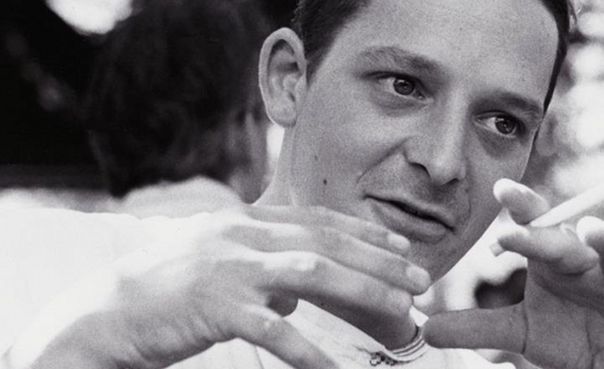Once Upon a Time There Was a Journalist…
Barbara Majsa

CHRIS THE SWISS (2018), directed by Anja Kofmel, is a hybrid documentary that makes great use of archival footage and animated images while telling the story of a young Swiss journalist, Chris, who died mysteriously at the very beginning of the Yugoslav Wars. It is Kofmel’s attempt to create a timeline of Chris’ last years, connect the dots, and try to find some answers regarding his murder. Nonetheless, the end product has turned out to be something more than a simple portrait of a journalist who chose battlefields as his workplace.
During the 1990s, the Balkans were shaken by blood-soaked events that were covered by the media worldwide. After the Berlin Wall collapsed, the desire for independence started to spread in ex-Yugoslavia, and, unlike the dissolution of Czechoslovakia, its breakup was by no means peaceful. Several wars broke out, including the Croatian War of Independence, the Bosnian War, the Kosovo War. Journalists from all over the world arrived in the region, many of them in Sarajevo (the epicentre of the Bosnian War) to inform about the events taking place. They were mostly stationed at the hotel Holiday Inn situated in the heart of Sarajevo, a city that was under siege between 1992 and 1996.
One of the journalists, hungry for stories and capable of seeing the terror of the wars right at the front lines, was Christian Würtenberg – Anja Kofmel’s 26-year-old cousin and the film’s protagonist. As the story evolves, he turns his back on journalism and joins the Croatian army’s First International Unit founded by Eduardo Rózsa-Flores aka Chico who turns out to be a rather controversial persona. Similarly to his fellow journalists, Chris feels like he has a great responsibility when reporting on one of the bloodiest wars fought after WWII, however, he soon encounters a moral dilemma. Eventually, he puts on a uniform of a paramilitary group to engage in the conflict actively, and this metamorphosis raises several questions. What can and cannot be achieved by journalism / journalists? Where does someone stop being a journalist? When is an activist born? What are the ethical concerns surrounding such a transformation? Indeed, Chris’ life journey comes across as a surprising one, and Anja Kofmel’s findings only complicate his story, as he is faced with the challenge of seeing things in a new light. Probably, originally, she aimed at directing a film on her cousin whom she looked up to, but her quest undoubtedly results in something else. Inspired by her cousin’s diaries, she, just like Chris, travels by train and visits the places where her cousin stopped by back at the time, looking for stories. In a way, she follows in his footsteps and plays the role of a journalist-like investigator as well, when she has to face a dilemma of her own. As opposed to her cousin, the medium of documentary film allows her to be more subjective, yet she must overcome the challenge of dealing with both personal and collective memories simultaneously – how to incorporate the theme of the Yugoslav Wars that evokes vivid memories in many.
In order to enhance the separation of storylines, she constructs her films using three kinds of moving images: animation, live action, and archival footage. On the one hand, Chris’ undocumented moments are shown as animation, a form of re-enactments, as those are imagined and probably not absolutely accurate. These images truly stand out. On the other hand, the interviews with Chris’ friends or people who interacted with him are shot traditionally. Those convey a wealth of information, even stick to the standards of TV journalism. Still, there are also Kofmel’s appearances that reveal more about her visual style, and also resemble dream sequences – especially when she is filming herself on the train. Despite the fact that they are intended to associate her with Chris, these particular scenes feel superfluous and artificial. Then, there are also the graphic images of the wars the director is not afraid of showing, but she always tries to keep the focus on Chris who died only one year into the conflict. CHRIS THE SWISS, co-produced by Switzerland, Croatia, Germany, and Finland, belongs to this emerging genre that builds up on traditional documentaries and enjoys popularity nowadays, which also means that the trend will continue into the future. Filmmakers can both take advantage of the format and submit their films to animation film festivals, for instance. Due to its hybrid format, Kofmel’s piece, for example, has been screened at the Annecy International Animation Film Festival, one of the most prominent events dedicated to animation. Concerning the boundaries between documentary filmmaking and investigative journalism, no future is determined – when everything is a story, whether a piece of journalism or a film is being scrutinized, that delicate fine line will become more and more problematic.
Despite the controversy around the film in one of the co-producing countries, CHRIS THE SWISS landed at the Cannes Critics’ Week and its regional and Bosnian premiere took place at the 24th edition of the Sarajevo Film Festival. After the film was finalized, the Croatian Audiovisual Centre denounced it and refused to pay €150,000 as part of its rebate system. Considering the film’s topic and revelations, it will truly spark more debates on a period in time that has become part of the collective memory in the former Yugoslav countries, even if history has been and will be documented from various points of view.

